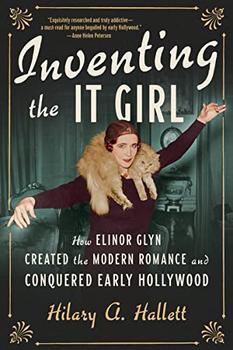Summary | Excerpt | Reviews | Beyond the Book | Readalikes | Genres & Themes | Author Bio

How Elinor Glyn Created the Modern Romance and Conquered Early Hollywood
by Hilary A. Hallett
The marriage proved a misalliance and she soon turned to her pen for escape and, later, the economic survival of her family, which included her two little girls, Margot and Juliet. Elinor Glyn's story begins in the privacy of her stepfather's library, where, like so many women who became writers in her day, she had unfettered access to the materials she would draw on to fashion her own ideas about how life and love should work.
Here is the place—in the aftermath of an adult woman's reckoning with a difficult sexual and social adjustment to marriage—where Glyn would leave her mark as a writer. By 1901, she had become society's premiere chronicler before devising, at the age of 43, the erotically focused modern romance novel with her great success-de-scandal, Three Weeks (1907). The novel celebrated the titularly short, illicit affair of an older, unhappily married Slavic queen and the patrician young lover she selects and schools in erotic arts to conceive their love child. Perhaps the most widely denounced work of popular fiction published before World War I, Glyn's "free love" novel helped to splinter the genteel code in English literature years before D.H. Lawrence's more celebrated troubles with the censors. Three Weeks also reportedly sold more than 2 million copies in English by 1917, when republication in a cheaper "million-seller" edition produced an estimated 5 million copies. Translated into every major European language, it spawned a host of imitators, generating at least twelve adaptations in print and on stage, film, and television through 1977.
By the 1920s, "if a director wanted to show that one of the characters in his film was leading a racy life, all he had to do was show her holding a copy of Three Weeks in her lap, just holding the book was enough to tag her as independent and modern," a silent-era film archivist observed decades later, explaining why Ohio censored a Disney cartoon in 1930 for showing Clarabelle the cow in a field reading Glyn's bad book.
Although ostracized by much of British society, the popularity of her pro-sex tale purchased her a freedom of expression that the censors and the critics could not silence. Glyn rode her notoriety to unparalleled celebrity for a female author and, in the aftermath of her sudden rise to international fame, concocted a glamorous literary persona who blended her imposing stature as a very fashionable British lady with the seductiveness of her Tiger Queen heroine (so-called for the novel's most infamous sex-scene on a tiger skin). This persona smoothed the acceptance of her naughty book.
The fame Glyn accumulated first as a novelist, and then as a journalist in Paris writing on modern morals and the state of society during World War I, led to her remarkable third act. Movie producers invited her to Hollywood in 1920 at the age of 56. In Los Angeles, she quickly established her leadership over the movie colony's young residents and taught Hollywood's first stars and directors how to express passion on the screen with a persuasiveness and finesse that delighted audiences and quieted the howls of the moral reformers during the Jazz Age. Glyn baked her approach to staging heterosexual sex into the visual style of mass culture. Rose petals, silken lingerie, long velvet gowns, and ropes of pearls have never gone out of fashion for signaling a woman's sexual self-possession. Smoldering looks, long kisses, lingering caresses, and embraces that contain a show of force became the stock-in-trade of the romance, whatever medium. She conceived all of these.
For it is no exaggeration to say that all modern romance falls under the shadow cast by her chic silhouette. Elinor Glyn's reorientation of the romance novel toward the "sex novel" focused on the essential, and often difficult, role that sexual passion played in love. This added the special ingredient that led the genre to outsell all others over the twentieth century (alongside detective stories).
Excerpted from Inventing the It Girl: How Elinor Glyn Created the Modern Romance and Conquered Early Hollywood. Copyright © 2022 by Hilary A. Hallett. Used with permission of the publisher, W. W. Norton & Company, Inc. All rights reserved.
Your guide toexceptional books
BookBrowse seeks out and recommends the best in contemporary fiction and nonfiction—books that not only engage and entertain but also deepen our understanding of ourselves and the world around us.